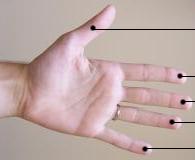Digit (anatomy)
(Redirected from Digiti)
Adigit is a finger or toe in tetrapods. Humans have five digits on each hand and foot, which are commonly referred to as fingers and toes, respectively. The digits are numbered from one to five, starting with the thumb (or big toe) as digit one.
Structure[edit | edit source]
Each digit is composed of small bones called phalanges. The thumb and big toe have two phalanges, while the other digits have three. The phalanges are connected by joints and are covered by skin, muscles, and nails.
Function[edit | edit source]
Digits play a crucial role in grasping, manipulating objects, and locomotion. In humans, the opposable thumb allows for a powerful grip and precise movements, which are essential for tool use and fine motor skills. In other animals, digits may be adapted for various functions such as climbing, swimming, or digging.
Evolution[edit | edit source]
The evolution of digits is a significant event in the history of vertebrates. Early tetrapods had more than five digits, but the number was reduced to five in most modern species. This reduction is thought to be an adaptation to more efficient movement and manipulation.
Clinical Significance[edit | edit source]
Digits can be affected by various medical conditions, including fractures, arthritis, and congenital anomalies such as polydactyly (extra digits) and syndactyly (fused digits). Proper function of the digits is essential for daily activities, and injuries or deformities can significantly impact a person's quality of life.
See Also[edit | edit source]
Search WikiMD
Ad.Tired of being Overweight? Try W8MD's physician weight loss program.
Semaglutide (Ozempic / Wegovy and Tirzepatide (Mounjaro / Zepbound) available.
Advertise on WikiMD
|
WikiMD's Wellness Encyclopedia |
| Let Food Be Thy Medicine Medicine Thy Food - Hippocrates |
Translate this page: - East Asian
中文,
日本,
한국어,
South Asian
हिन्दी,
தமிழ்,
తెలుగు,
Urdu,
ಕನ್ನಡ,
Southeast Asian
Indonesian,
Vietnamese,
Thai,
မြန်မာဘာသာ,
বাংলা
European
español,
Deutsch,
français,
Greek,
português do Brasil,
polski,
română,
русский,
Nederlands,
norsk,
svenska,
suomi,
Italian
Middle Eastern & African
عربى,
Turkish,
Persian,
Hebrew,
Afrikaans,
isiZulu,
Kiswahili,
Other
Bulgarian,
Hungarian,
Czech,
Swedish,
മലയാളം,
मराठी,
ਪੰਜਾਬੀ,
ગુજરાતી,
Portuguese,
Ukrainian
Medical Disclaimer: WikiMD is not a substitute for professional medical advice. The information on WikiMD is provided as an information resource only, may be incorrect, outdated or misleading, and is not to be used or relied on for any diagnostic or treatment purposes. Please consult your health care provider before making any healthcare decisions or for guidance about a specific medical condition. WikiMD expressly disclaims responsibility, and shall have no liability, for any damages, loss, injury, or liability whatsoever suffered as a result of your reliance on the information contained in this site. By visiting this site you agree to the foregoing terms and conditions, which may from time to time be changed or supplemented by WikiMD. If you do not agree to the foregoing terms and conditions, you should not enter or use this site. See full disclaimer.
Credits:Most images are courtesy of Wikimedia commons, and templates, categories Wikipedia, licensed under CC BY SA or similar.
Contributors: Prab R. Tumpati, MD




